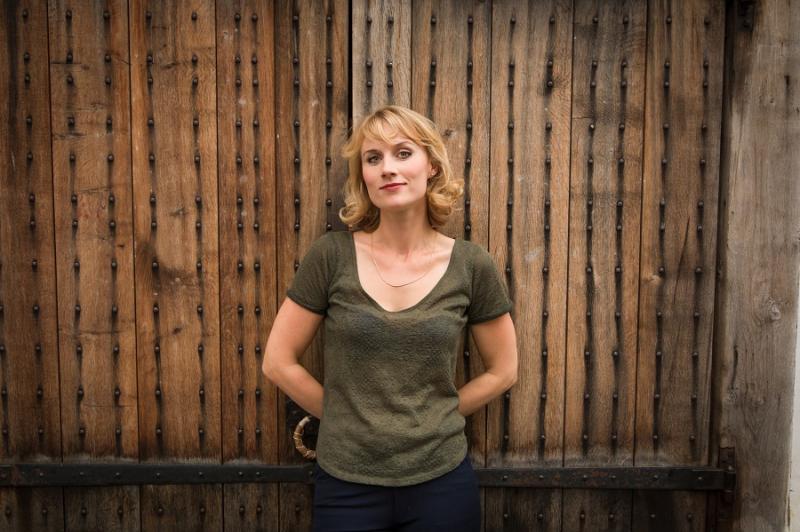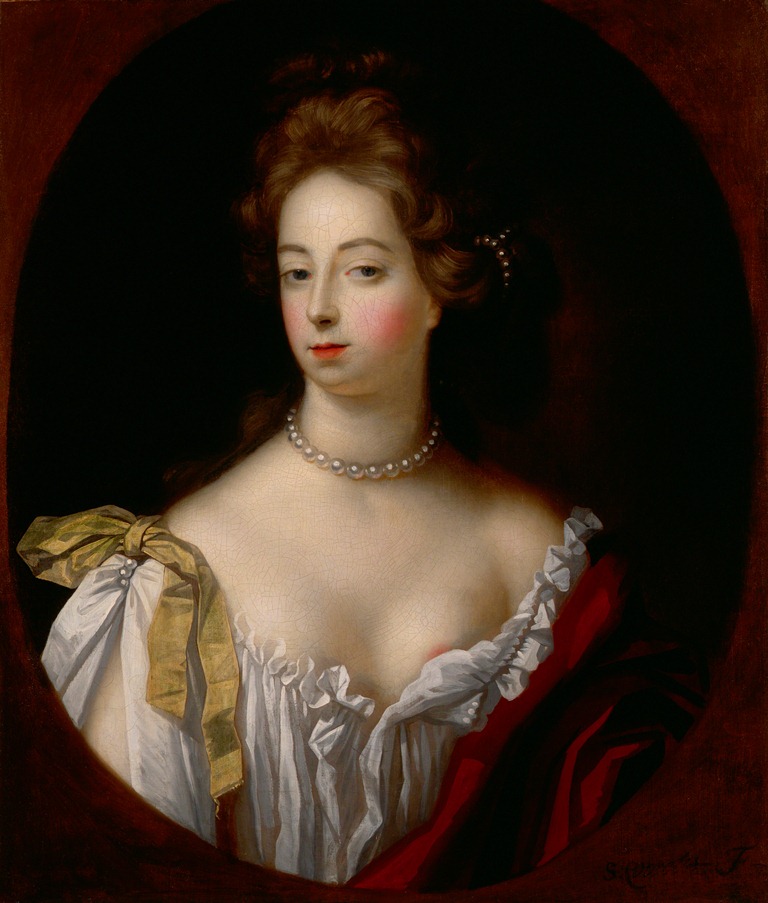The restoration of Nell Gwynn | reviews, news & interviews
The restoration of Nell Gwynn
The restoration of Nell Gwynn
Playwright Jessica Swale on unearthing the truth about the celebrated actress

I never thought I’d be a writer. Writers are people with something to say, big ideas, agendas. I was a director, through and through. I love working with actors, playing with music and text, thinking in three dimensions. The solitary confinement of a writer’s life filled me with dread.
I’d been working as Max Stafford-Clark’s Associate Director at Out of Joint. We were rehearsing Sebastian Barry’s play, Andersen’s English, and I’d been tasked with investigating the likely aspirations of a young woman in the 1800s. So off I went – to the hallowed ground that is Wikipedia – and that’s where everything changed. For there, amongst the paragraphs about Victorian life, one line catapulted straight off the page at me. In 1869 Emily Davies opens the first British University College for women. The first? In 1869? I clicked through to an article. Girton College, Cambridge. Britain’s first residential college for women… first female students… weren’t allowed to graduate.

I read on. The right to graduate was reserved for men only. Women protested – riots in 1897 – mannequins of the girls burnt in the street – women eventually win graduation rights…
When? I read on.
… in 1948.
I caught my breath. I read it, re-read it, those four figures stirring something deep and angry in my guts. Nineteen forty eight! Women had the vote, my grandma would have been pregnant with my mum, we’d been through two world wars, and yet women weren’t allowed a university degree – at Cambridge?!
And that was that. Suddenly I had a reason to write. I’d commission someone to write about it and I’d direct. But three sleepless nights later, I realised that would be impossible. The world of the play had already begun to form in my imagination. The gutsy heroine, the unshakeable Don, the comic chaperone. It was too late. I couldn’t hand it over. There was nothing for it but to write it myself.
Since then I’ve enjoyed living a double life, balancing writing and directing, happily hopping from one to the other. I’ve surprised myself. I’ve discovered that I like the solitary confinement of writing after all. After a month in a busy rehearsal room, tech weeks and long days, I find it energising to start again with a blank page. Then, what keeps me going on the flip side, in the hair-tearing moments of playwriting hell, is knowing that soon I’ll be back in a room with real people, working on a play which I’m not wholly responsible for, that some other writer slaved over, and I have the joyful job of bringing it to life.
Perhaps the best thing about writing is that I get to do my real passion projects
There was a time, as little as a decade ago, where we were warned ominously about the dangers of mixing roles. At drama school it was drummed into us: choose your role, be good at it, get known for it – who’s going to take you seriously if you’re a writer and a director, an actor and a writer? Oh God, you won’t work! You’ll be penniless! You’ll be a joke! But with the financial climate and arts funding as it is, it’s become imperative (and exciting) to rethink the boundaries. And I love multi-tasking; I believe doing both improves each skill. It certainly keeps me busy.
Perhaps the best thing about writing is that I get to do my real passion projects. The plays that start from a kernel, that you love and nurture, incubating them until you finally feel ready to share them with someone else. Terrifying. Exhilarating. My latest play, Nell Gwynn, is perhaps my biggest passion project. It’s certainly the work I’m proudest of.
I’ve been fascinated by Restoration theatre since studying it at university. Ironically, I don’t remember reading a single play – but we sucked the period dry for historical detail. And what a period it was. For 11 years, during the interregnum (1649-60), London was subdued by Cromwell – a period I think of as the "beige bit" when the Puritans banned anything fun, including theatre (and Christmas). Then Charles II turned up and not only reopened the theatres, but put women on the stage for the first time.
What a time to be alive! Theatre had to reinvent itself. What would this new theatre herald? What sort of plays? What sort of acting? And women… actresses?! What an idea!
 Enter Nell Gwynn. A young East Ender from Coal Pan Alley, who sold oranges to the crowds at Drury Lane. Who, through her miraculous wit and natural talent, made her way up the ranks, became the most popular actress of her day, the lover of Charles Hart, the Restoration’s heartthrob and then went on to the palace, where she conquered the heart of the King. And yet, what do we know of her? Oh – she sold oranges. And her name appears on a couple of pubs. (Pictured, Nell Gwynne, c 1680, by Simon Verelst, courtesy NPG.)
Enter Nell Gwynn. A young East Ender from Coal Pan Alley, who sold oranges to the crowds at Drury Lane. Who, through her miraculous wit and natural talent, made her way up the ranks, became the most popular actress of her day, the lover of Charles Hart, the Restoration’s heartthrob and then went on to the palace, where she conquered the heart of the King. And yet, what do we know of her? Oh – she sold oranges. And her name appears on a couple of pubs. (Pictured, Nell Gwynne, c 1680, by Simon Verelst, courtesy NPG.)
Why isn’t this heroine, one of the most important women in theatre history, the focus of countless plays? She’s the female Dick Whittington – better – and his story is told every Christmas. Yet she is hardly known. Granted, she turns up occasionally as a bit part – a "tit part" – most often to supplement the action with the odd naughty joke. But why?
Let’s be honest. It’s a constant issue in theatre. History is told on stage by men about men – and yet fantastic women, and women’s stories traditionally have had very little air time. I could give you a list of the countless dull plays I’ve watched about dull men whose life stories really weren’t worth recounting. What’s going on?
There are a wealth of great characters and incidents whose stories haven’t been told – and they are, for the most part, the stories about women, the working class, black and ethnic minorities – everyone but middle-aged, middle-class white guys whose stories we’ve heard till the cows came home. Sure, there are more famous white men in history. But open any encyclopaedia and you’ll be amazed by the fantastic, ground-breaking lives of people you’ve never heard of.
This is where I start to sound like a writer with an agenda. Perhaps I am. I don’t want to limit myself to period plays about women; funnily enough, of the plays I’ve written, only two (of six) fall into that category. But here’s the simple truth of it. I’m a writer. I’m constantly looking for sources of inspiration, and while there are still brilliant stories, real stories, which need telling, I’m going to go right on telling them.
- Nell Gwynn is in rep at Shakespeare's Globe until 17 October
Explore topics
Share this article
The future of Arts Journalism
You can stop theartsdesk.com closing!
We urgently need financing to survive. Our fundraising drive has thus far raised £49,000 but we need to reach £100,000 or we will be forced to close. Please contribute here: https://gofund.me/c3f6033d
And if you can forward this information to anyone who might assist, we’d be grateful.

Subscribe to theartsdesk.com
Thank you for continuing to read our work on theartsdesk.com. For unlimited access to every article in its entirety, including our archive of more than 15,000 pieces, we're asking for £5 per month or £40 per year. We feel it's a very good deal, and hope you do too.
To take a subscription now simply click here.
And if you're looking for that extra gift for a friend or family member, why not treat them to a theartsdesk.com gift subscription?
more Theatre
 Ragdoll, Jermyn Street Theatre review - compelling and emotionally truthful
Katherine Moar returns with a Patty Hearst-inspired follow up to her debut hit 'Farm Hall'
Ragdoll, Jermyn Street Theatre review - compelling and emotionally truthful
Katherine Moar returns with a Patty Hearst-inspired follow up to her debut hit 'Farm Hall'
 Troilus and Cressida, Globe Theatre review - a 'problem play' with added problems
Raucous and carnivalesque, but also ugly and incomprehensible
Troilus and Cressida, Globe Theatre review - a 'problem play' with added problems
Raucous and carnivalesque, but also ugly and incomprehensible
 Clarkston, Trafalgar Theatre review - two lads on a road to nowhere
Netflix star, Joe Locke, is the selling point of a production that needs one
Clarkston, Trafalgar Theatre review - two lads on a road to nowhere
Netflix star, Joe Locke, is the selling point of a production that needs one
 Ghost Stories, Peacock Theatre review - spirited staging but short on scares
Impressive spectacle saves an ageing show in an unsuitable venue
Ghost Stories, Peacock Theatre review - spirited staging but short on scares
Impressive spectacle saves an ageing show in an unsuitable venue
 Hamlet, National Theatre review - turning tragedy to comedy is no joke
Hiran Abeyeskera’s childlike prince falls flat in a mixed production
Hamlet, National Theatre review - turning tragedy to comedy is no joke
Hiran Abeyeskera’s childlike prince falls flat in a mixed production
 Rohtko, Barbican review - postmodern meditation on fake and authentic art is less than the sum of its parts
Łukasz Twarkowski's production dazzles without illuminating
Rohtko, Barbican review - postmodern meditation on fake and authentic art is less than the sum of its parts
Łukasz Twarkowski's production dazzles without illuminating
 Lee, Park Theatre review - Lee Krasner looks back on her life as an artist
Informative and interesting, the play's format limits its potential
Lee, Park Theatre review - Lee Krasner looks back on her life as an artist
Informative and interesting, the play's format limits its potential
 Measure for Measure, RSC, Stratford review - 'problem play' has no problem with relevance
Shakespeare, in this adaptation, is at his most perceptive
Measure for Measure, RSC, Stratford review - 'problem play' has no problem with relevance
Shakespeare, in this adaptation, is at his most perceptive
 The Importance of Being Earnest, Noël Coward Theatre review - dazzling and delightful queer fest
West End transfer of National Theatre hit stars Stephen Fry and Olly Alexander
The Importance of Being Earnest, Noël Coward Theatre review - dazzling and delightful queer fest
West End transfer of National Theatre hit stars Stephen Fry and Olly Alexander
 Get Down Tonight, Charing Cross Theatre review - glitz and hits from the 70s
If you love the songs of KC and the Sunshine Band, Please Do Go!
Get Down Tonight, Charing Cross Theatre review - glitz and hits from the 70s
If you love the songs of KC and the Sunshine Band, Please Do Go!
 Punch, Apollo Theatre review - powerful play about the strength of redemption
James Graham's play transfixes the audience at every stage
Punch, Apollo Theatre review - powerful play about the strength of redemption
James Graham's play transfixes the audience at every stage
 The Billionaire Inside Your Head, Hampstead Theatre review - a map of a man with OCD
Will Lord's promising debut burdens a fine cast with too much dialogue
The Billionaire Inside Your Head, Hampstead Theatre review - a map of a man with OCD
Will Lord's promising debut burdens a fine cast with too much dialogue

Add comment